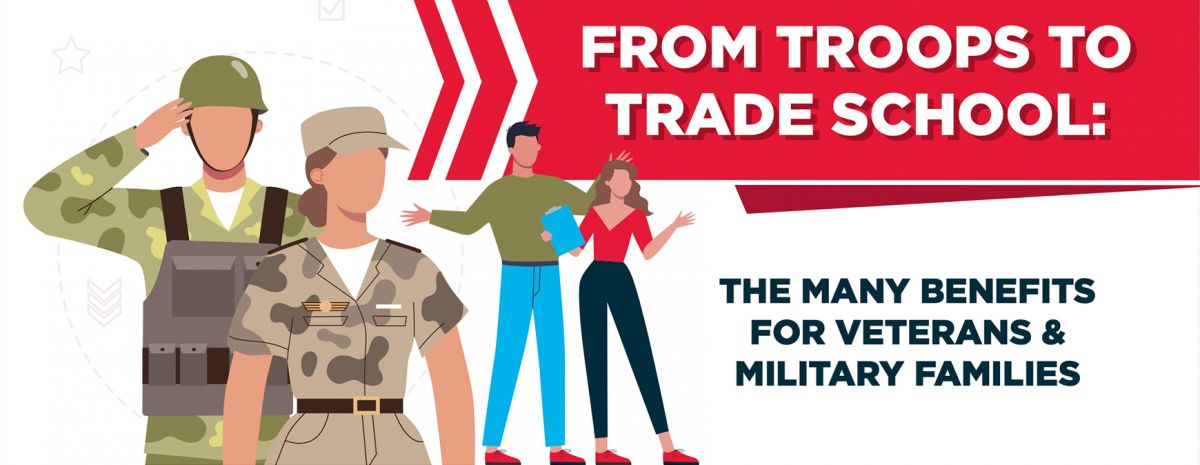
Many veterans pursue a higher education to help with the transition to civilian life.1 Perhaps because a higher education can lead to higher earnings and lower unemployment.2
The problem is, veterans often “do not fit the mold of the traditional 18- to 22-year-old college student.” They tend to be older and have families and jobs. Plus, they often bring A LOT more life experience to campus. So, they tend to face unique challenges in college.1
Fortunately, college isn’t the only path to a higher education. Many veterans choose vocational or technical schools instead.1 And trade school can be a military-friendly option for veterans, active duty service members, National Guard, Reserve, and their families.3
4 Reasons Veterans Seek Higher Education
- Increase career opportunities
- Learn new skills
- Develop the ability to apply military skills in civilian life
- Improve quality of life for themselves and their families1
15% of veterans choose trade school over college.1
What Is Trade School?
You get to learn by doing. Because trade schools usually offer hands-on training.4
Also known as: Vocational school4
Definition: A higher education institution offering specialized training for a specific career.4 Trade school programs usually take half or a quarter of the time necessary to complete a bachelor’s degree.5
Some trades common to military students include:
- Welding4
- Heating, ventilation, air conditioning, refrigeration (HVACR) technician5
- Electrician5
- Plumber5
Credential: Certificate or diploma. Some trade schools offer associate degrees.6
What Active Duty Service Members and Veterans Say about Trade School
“I enjoy fixing things, solving problems, but really, I enjoy helping people. I try not to charge a whole lot because some people can’t afford it. I try to make it easy on them, but at the same time I still make money. I’m honest with people: I just fix what needs fixing, and it’s still practice for me, too. Sometimes it’s a challenge to get it right.” — Alton Baker, Tulsa Welding School Professional Welder and Refrigeration Technologies programs graduate
“I enjoy building stuff, being part of a team that’s building something. And I like that I can drop my hood and just get on with my own thing.” — Robby Pennington, Tulsa Welding School Professional Welder program graduate
“What I personally like most is being able to show my craftsmanship and my pride in my work. There’s a saying I learned: ‘You’re only as good as your last weld.’ You can have a bad weld, but it’s fine as long as your next one comes out better.” — Mark Moreno, Tulsa Welding School Welding Specialist with Pipefitting program graduate
Why Trade School Can Be a Good Option for Veterans and Military Families
Trade school can be a good alternative to college because…
Veteran Students Are Not Your Typical College Students:
- 75% of veteran students are 24-40 years old.
- 62% of veteran students are first-generation college students.
- 47% of veteran students have kids.
- 47.3% of veteran students are married.1
Nearly half of veteran students are members of military families.1
And military families have unique challenges and needs.7
Blue Star Families asked 11,000+ active duty service members, veterans, National Guard, Reserve, and their spouses about their biggest challenges navigating military and civilian life.7
Guess what the top challenge for veterans and military families was?
#1 Challenge: Financial Hardship
Financial issues are a top stressor:7
- 44% of service members
- 49% of military spouses
- 53% of veterans
- 54% of veteran spouses7
5 Possible Contributing Factors to Financial Hardship
- Under- and Unemployment of Spouse:7
- 48% of military spouses
- 27% of service members
- 13% of veterans
- Military Benefits:7
- 16% of military spouses
- 19% of service members
- 37% of veterans7
- Military Pay:7
- 33% of military spouses
- 33% of service members
- 29% of veterans
- Veteran Employment:7
- 8% of military spouses
- 12% of service members
- 30% of veterans7
- Lack of Childcare:7
- 21% of service members
- 30% of military spouses
- 13% of veterans7
4 Ways Trade School Can Help with Financial Stressors
1. Trade School Can Cost Less than College
- Average total cost of a four-year degree:*$66,161.208
- Average total cost of a less than two-year education:*$29,037.888
- Total cost of TWS Professional Welder program:*$20,9839
= ~$45,178.20 savings
*4-year private for-profit institution tuition and fees for 2018-2019 school year
*Less than 2-year private for-profit tuition and fees for 2018-2019 school year
*2020-2021 school year
2. Trade School Financial Aid Departments Can Help with Finding Funding for Training
- Assistance with applying your military benefits to vocational training10
- Military tuition pricing11
- Help finding and filling out the right forms for financial aid10
- Locating and applying for possible scholarship opportunities10
3. Trade School Can Lead to Higher Earnings and Lower Unemployment
Veteran Earnings
Veterans with certificates and certifications often earn more than veterans without them. Certificates and certifications can help veterans see an average bump of $10,000 in median income)*12
Earnings for Veterans with Certificates or Certifications vs. Those Without Them12
| Career | Median Income WITHOUT Certificate or Certification | Median Income WITH Certificate or Certification | Income Differences |
| Construction or mining | $45,000 | $60,000 | $15,000 |
| Installation, maintenance or repair | $45,000 | $58,000 | $13,000 |
| Building and grounds cleaning and maintenance | $25,000 | $35,000 | $10,000 |
| Manufacturing and production | $38,000 | $47,000 | $9,000 |
| Transportation worker | $46,000 | $54,000 | $8,000 |
*Statement applies to veterans who do not hold a degree from a postsecondary institution.
Veteran Employment
Veterans with certificates and certifications are more likely to have a job than those without these credentials: 73% versus 64%.12*
Top Careers for Veterans with Certificates or Certifications:*
- 12% work in installation, maintenance, and repair
- 11% work in the transportation industry
- 10% work in construction or mining
- 7% work at the manager or executive level
- 7% work for security and protective services12
*Statement applies to veterans who do not hold a degree from a postsecondary institution.
4. Trade School Can Offer Flexible Class Schedules
Veterans are usually older than their college classmates and more likely to be married or coupled, have kids, and attend school part time. Many veterans use their GI Bill benefits to pay for school.1
About 60% of student veterans report concerns about balancing school and other responsibilities, reports the U.S. Department of Veterans Affairs.1
Fortunately, many trade schools offer classes during the day, the evening, and on the weekends.13 And flexible class schedules can help reduce the likelihood of scheduling conflicts for working parents going back to school.14
Veterans Don’t Always “Fit In” on College Campuses
Beyond financial stressors, veterans may not feel like they “fit in” with their college classmates because of differences in culture, learning style, and disabilities.1
Military Culture vs. College Culture
| Military Culture | College Culture |
| Follow orders | Think independently |
| Respect rank and formality | Act informally in many classrooms |
| Take school seriously | Take school less seriously and act entitled |
| Pro military | Negative opinions about military |
Military Training vs. College Academics
Veteran students may have concerns about meeting the academic standards at college because they can be quite different from the military’s.1
| Military Training | College Academics |
| Duty specific | General education |
| Practical | Abstract |
Student Veterans with Disabilities
Physical and emotional injuries can plague veterans long after they leave the battlefield:1
- Amputations
- Join pain
- Back pain
- Hearing problems
- Traumatic brain injury
- Posttraumatic stress disorder
- Major depression
- Anxiety1
Why Trade School Could Be a Good Fit for Veterans
Cultural Fit
Some trade schools, for example Tulsa Welding School, are Military Friendly.3 Military Friendly is a standard that measures a school’s commitment, effort, and success in creating meaningful and sustainable benefits for the military community:15
- Active duty
- Reserve
- Guard
- Veterans
- Military spouses15
Trade schools that receive the Military-Friendly designation have proven that they always strive to do more to support veterans and empower the military community.15
Academic Fit
Trade schools focus on teaching students practical skills for a specific career, for example welding.4 Unlike at most U.S. colleges and universities, trade schools typically don’t require students to take English or other general education classes.16
Supportive of Veterans with Disabilities
Many trade schools have nondiscrimination policies. For example, Tulsa Welding School “prohibits discrimination on the basis of…mental and physical disability.” Plus, TWS is “committed to ensuring equal access to educational opportunities for students with disabilities.”9
More Veterans Choose Trade School
And many veterans are satisfied with this level of educational attainment.12
Among all adults who forgo 4 years of college, veterans are much more likely to earn a certificate or a certification: 57% of veterans compared to 35% of non-veterans.12
Not only can veterans with certificates or certifications enjoy greater employability and earnings than those without these credentials, but they’re also Less Likely to See the Need for Additional Education.12
These veterans are even more likely to recommend their educational path than veterans without certificates or certifications: 68% versus 47%.12
Join Them
Want to train for a career in the skilled trades with your fellow veterans and service members? Take the first step: chat with a Tulsa Welding School team member today. Call 855-237-7711 now.
Have You Considered a Career in the Skilled Trades?
Fill out the form to recieve a no obligation info packet.
Additional Sources
1 https://www.mentalhealth.va.gov/student-veteran/learn-about-student-veterans.asp
2 https://www.bls.gov/careeroutlook/2020/data-on-display/education-pays.htm
3 https://www.militaryfriendly.com/schools/
4 https://learn.org/articles/What_is_a_Trade_School.html
5 https://www.indeed.com/career-advice/finding-a-job/trade-school
6 https://education.seattlepi.com/degrees-can-earn-trade-school-3395.html
7 https://bluestarfam.org/wp-content/uploads/2020/03/BSF-2019-Survey-Comprehensive-Report-Digital-rev200305.pdf
8 https://collegecost.ed.gov/affordability
9 https://www.tws.edu/wp-content/uploads/tws-school-catalog.pdf
10 https://www.tws.edu/tuition-planning/financial-aid/
11 https://www.tws.edu/tuition-planning/military-benefits/
12 https://cci.stradaeducation.org/report/veterans-without-degrees/
13 https://www.tws.edu
14 https://www.parents.com/parenting/work/life-balance/going-back-to-school-as-a-parent/
15 https://www.militaryfriendly.com/faqs/
16 https://study.com/articles/Why_You_Should_Consider_a_College_That_Doesn_t_Require_General_Education_Requirements.html
This blog has been labeled as archived as it may no longer contain the most up-to-date data. For a list of all current blog posts, please visit our blog homepage at https://www.tws.edu/blog/





